Observation and Quantitative Evaluation of Wiring Harnesses and Crimped Connectors
With the increasing demand for electronic devices, automobiles, and similar applications, wiring harnesses are now required to have higher functionality and quality, such as smaller and lighter bodies.
This section introduces the appearance inspection points indispensable to ensure the quality of wiring harnesses and new examples of using KEYENCE's latest 4K Digital Microscope, which improves the work efficiency of magnified observation and quantitative measurement.
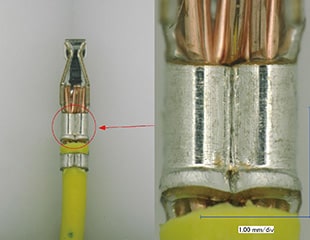
- Wiring Harnesses Having Higher Importance and Requirements
- Terminal Connection and Appearance Inspection of Electrical Wires
- Latest Examples of Appearance Inspection and Evaluation of Wiring Harnesses
- Depth composition that brings three-dimensional objects into full focus
- Warpage measurement of wiring harnesses
- Crimped core wire observation unaffected by glare from the metal surfaces
- Magnified imaging of crimped connectors of wiring harnesses
- Free-angle observation system, which streamlines observation of three-dimensional objects
- 3D shape analysis, which quantifies evaluation of crimp terminals
- Automatic measurement of crimped wire cross sections
- The Latest Tool for Quickly Responding to Market Demands
Wiring Harnesses Having Higher Importance and Requirements
A wiring harness, also known as a cable harness, is a component that bundles wires that allow electronic devices to transmit power or signals. The ends of wires are fitted with connectors to simplify connection and prevent incorrect connection. 500 to 1500 wiring harnesses may be used in a single automobile, working like blood vessels and nerves in human bodies. Any defects and breakages of wiring harnesses can greatly affect product safety as well as quality and performance.
In addition to the recent technologies that make electrical and electronic products smaller and denser, there have been technological breakthroughs in the automotive industry, such as electric vehicles (EVs), hybrid electric vehicles (HEVs), and the drive assist function and autonomous driving that use sensor technology. These technological improvements have increased demand for wiring harnesses, and it is now necessary to research, develop, and manufacture products that meet various requirements such as a greater variety of types, smaller bodies, lighter bodies, higher functionality, and higher durability. In response to such requirements, new and improved products need to be supplied to customers with higher quality and speed, which consequently requires higher accuracy and speed for evaluation in R&D and quality control.
Terminal Connection and Appearance Inspection of Electrical Wires
In wiring harness manufacturing, one of the processes important to ensure quality is the connection of terminals to wires, which is performed before assembling of parts such as connectors, tubes, protectors, clips, and clamps. The typical terminal connection process uses crimping, pressure-contact, or solder. In any method, defective connection can cause problems such as defective continuity and displaced core wires.
One quality inspection for wiring harnesses is to check for electrical disconnections and short-circuits using a continuity tester.
After tests determine a failure, it is necessary to use microscopes to inspect and evaluate the terminal connections. The following sections introduce the appearance inspection points in each connection method.
Appearance inspection points for connection by crimping
The wire and sheath are crimped with respective barrels of the terminal, which uses the barrels' plasticity. The barrels are bent by crimping with a tool or automatic machine on a production line.
- Appearance inspection points
-
- (1) Core wire protrusion
- (2) Core wire projection length
- (3) Bellmouth amount
- (4) Sheath projection length
- (5) Cutoff length
- (6-1) Bend up (6-2) Bend down
- (7) Twist
- (8) Rolling
-
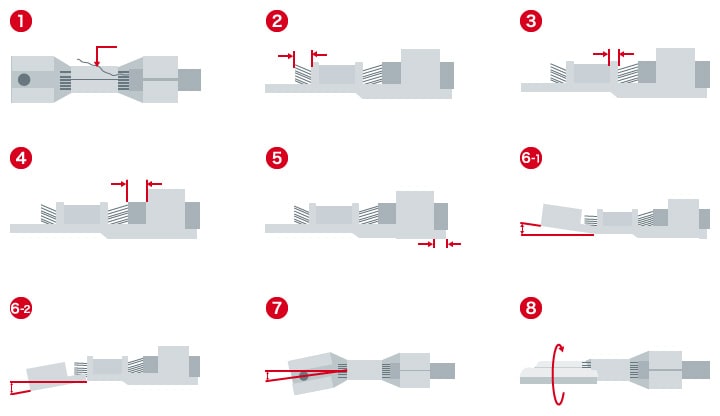
- TipsCrimp height, a criterion to determine the crimping quality of terminals
- Crimp height is the cross-section height of a core barrel or sheath barrel after crimping. Failure to crimp to a specified height causes defective continuity or displacement of the wire.
-
Pass/fail examples of crimp height of the sheath 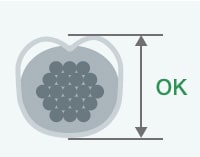
Non-defective (within specified tolerances) 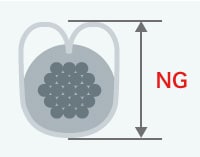
Poor crimping 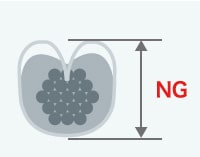
Excessive crimping - A crimp height larger than the specified height causes the wires to be disengaged when pulled, due to poor crimping. On the other hand, a crimp height smaller than the specified height causes the barrel to dig into the core due to excessive crimping, thereby leading to wire damage.
- Crimp height is simply a judgement criterion used to estimate the conditions of the sheath and core wire. In recent years, wiring harnesses have become smaller and have been made of an increased variety of materials. To detect all defects that occur in the crimping process, the conditions of the core wires need to be inspected quantitatively on cross sections of crimp terminals.
Appearance inspection points for connection by pressure contact
A terminal used in this method is connected by squeezing a sheathed wire into a slit. When the wire is pushed into the slit, the blade on the slit strips the sheath to establish a connection.
- Appearance inspection points
-
- (1) Wire overrun
- (2) Clearance at the wire tip
- (3) Conductor protrusion at the front or rear end of a pressure contact piece
- (4) Displaced pressure contact centre
- (5) Scratch on a housing
- (6) Scratch on or deformation of a pressure contact piece
- A: Housing
- B: Pressure contact piece
- C: Wire
-
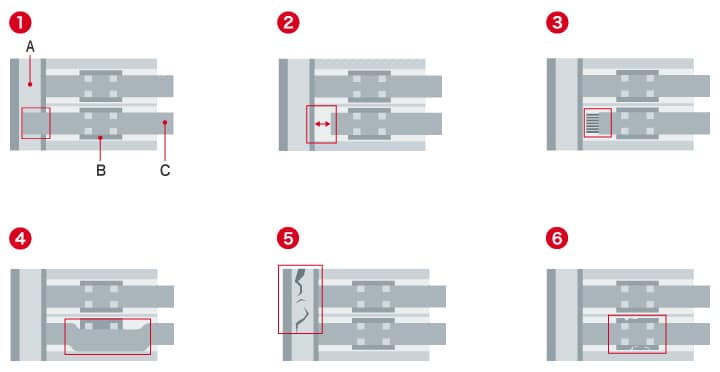
Appearance inspection points for connection by soldering
There are two typical methods: one is solder pot, in which the wire is inserted into a terminal, and the other is eyelet, in which the wire is passed through a hole.
- Appearance inspection points
-
- (1) Core wire protrusion
- (2) Defective soldering continuity (insufficient heating)
- (3) Solder bridge (excessive soldering)
-

Latest Examples of Appearance Inspection and Evaluation of Wiring Harnesses
As wiring harnesses are becoming increasingly smaller, it is becoming increasingly difficult to inspect and evaluate their appearances through magnified observation.
KEYENCE's VHX Series 4K Digital Microscope solves the problems of conventional microscopes; enabling quick high-magnification observation and inspection.
Depth composition that brings three-dimensional objects into full focus
Conventional microscopes do not fully focus on three-dimensional wiring harnesses, which makes complete and comprehensive observations and evaluations difficult.
The VHX Series performs depth-composition to capture fully-focused images of targets that have complex shapes and geometries.
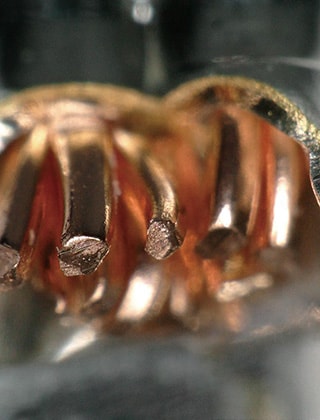
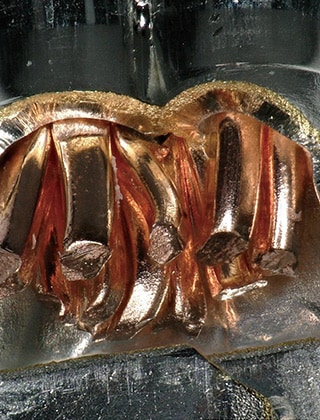
Warpage measurement of wiring harnesses
Conventional warpage measurement requires multiple measuring instruments in addition to microscopes. This inevitably lengthens the measurement processes, requiring more effort and time. Conventional microscopes also require measurements to be taken in a separate software, further decreasing throughput.
The VHX Series 4K Digital Microscope has a wide range of 2D measurement tools, which enables measurements such as wiring harness angle and crimp height of terminal cross sections. The VHX Series allows users to quantify measurements, store and manage measured values, and create reports; dramatically improving work efficiency. Images stored on the VHX Series can be recalled to perform additional measurements at a later date.
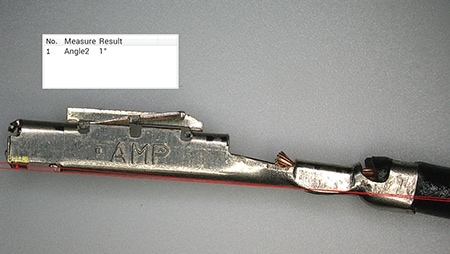
Crimped core wire observation unaffected by glare from the metal surfaces
Observation with conventional microscopes can be difficult due to reflection from metal surfaces.
With the glare removal function and ring reflection removal function, the VHX Series 4K Digital Microscope removes reflection from glossy metal surfaces, making it possible to accurately observe and understand the crimping conditions of the core wire.
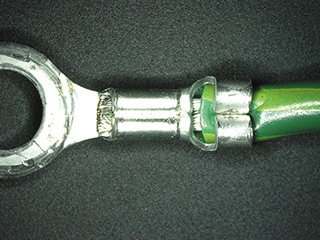
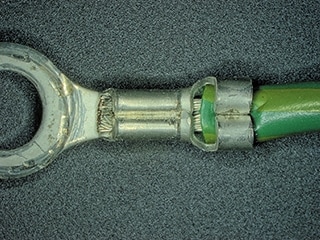
Magnified imaging of crimped connectors of wiring harnesses
In appearance inspection using conventional microscopes, it is difficult to focus on and observe small targets, such as three-dimensional crimped connectors of wiring harnesses.
The motorised revolver and high-resolution HR lens of the VHX Series 4K Digital Microscope enable a seamless zoom function that automatically switches magnification from 20x to 6000x. This enables quick magnified observation with a mouse or handheld controller.
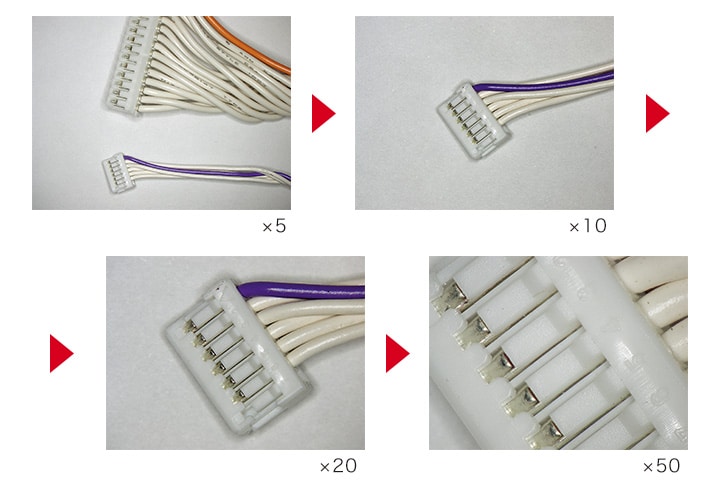
Free-angle observation system, which streamlines observation of three-dimensional objects
With conventional microscopes, inspection of wiring harnesses requires the target to be fixed at different angles, and the focusing must be readjusted for each angle.
The VHX Series 4K Digital Microscope uses a free-angle observation system and a high-accuracy XYZ motorised stage, thus supporting flexible movements of the head and stage that were conventionally impossible.
3-axis adjustment mechanisms enable easy field-of-view alignment, rotation, and oblique axis motion, allowing users to observe from any angle. Furthermore, eucentric design ensures that the target stays centred in the field of view, even if the lens is tilted or rotated, making visual inspection of three-dimensional targets much more efficient.
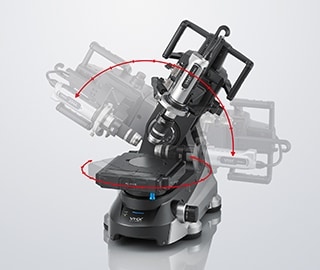
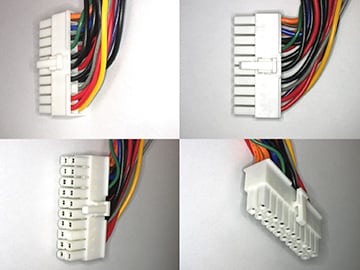
3D shape analysis, which quantifies evaluation of crimp terminals
In conventional appearance observation of crimp terminals, it is necessary to focus on each part of a three-dimensional target. Furthermore, such observation cannot eliminate the issues of defects going undetected and variations in evaluation occurring among operators. Moreover, there is no other way to perform evaluations than to use 2D measurements, even for three-dimensional targets.
The VHX Series 4K Digital Microscope not only allows for magnified observation and 2D measurements, but it also capable of capturing 3D shapes and performing 3D profile measurements. 3D shapes can be analysed and measured with simple operations, regardless of the skill level of the operator, which enables advanced and quantitative appearance evaluation of crimp terminals with higher work efficiency.
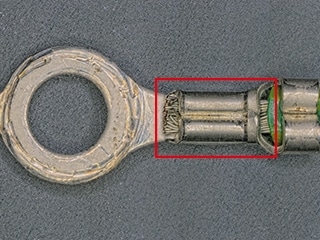
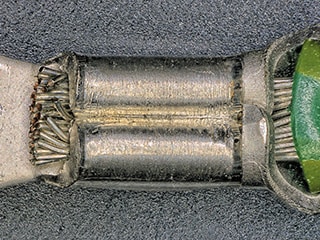
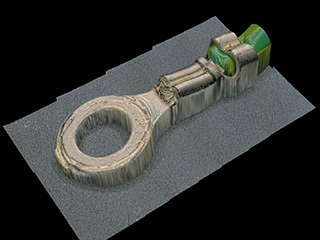
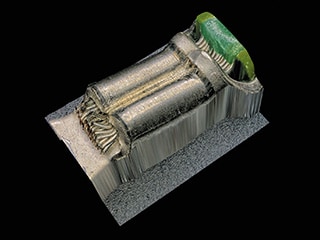
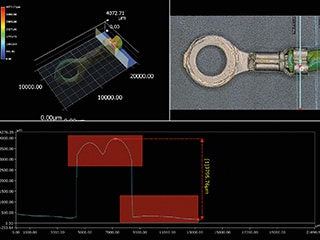
Automatic measurement of crimped wire cross sections
The VHX Series 4K Digital Microscope has a wide range of measurement tools, allowing users to perform various automatic measurements on a captured cross section image.
For example, as shown in the following images, the area of the wires can be automatically measured on the cross section of the crimped core wire. This allows users to inspect the conditions of the crimped wires quickly and quantitatively, which cannot be achieved by crimp height measurement and cross-section observation.
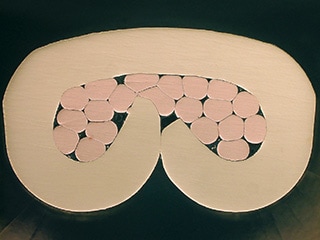
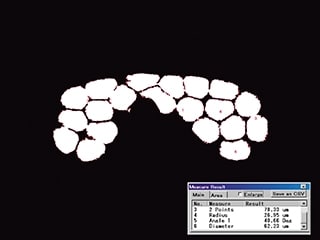
The Latest Tool for Quickly Responding to Market Demands
In response to increased demand and advanced market requirements for wiring harnesses, it is necessary to establish R&D, quality improvement, and manufacturing processes on the basis of data from speedy and accurate inspections.
By installing the VHX Series high-definition 4K Digital Microscope, work efficiency can be dramatically improved from that with conventional microscopes and high-definition observation, analysis, measurement, and evaluation (which were previously impossible) can be completed with a single unit. Equipped with many other advanced functions, the VHX Series can be an effective tool for industries that require both quality and speed.
For additional product info or inquiries, click the buttons below.


